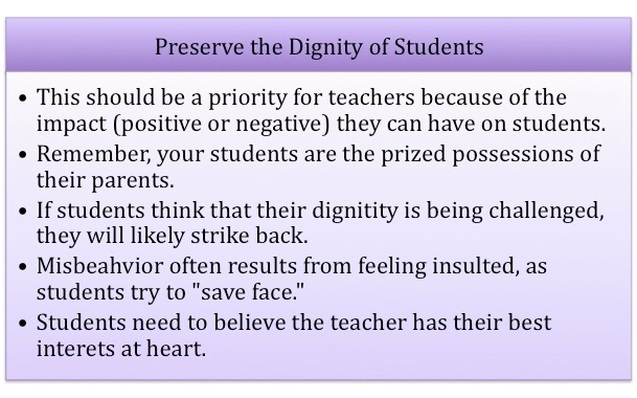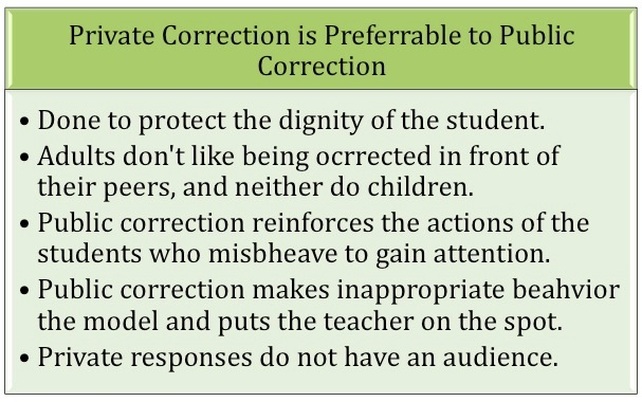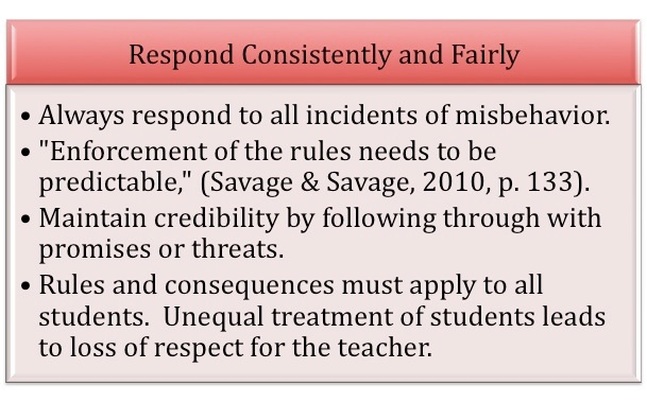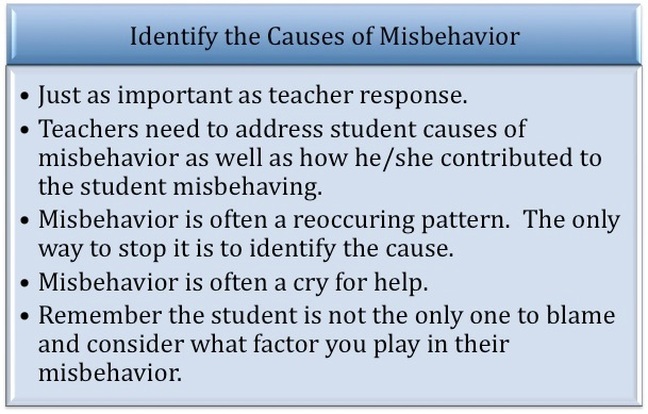Classroom Management & Discipline
The General Principles of Responding to Inappropriate Behavior
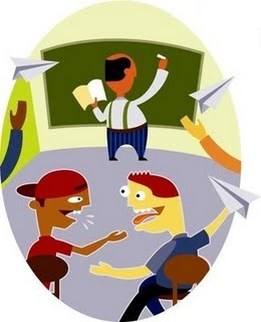
Although teachers should do everything they can to manage a classroom so as to prevent discipline, there will always come a time when a teacher must respond to incidents of misbehavior. As discussed in the definition of discipline, all actions towards misbehavior should allow for the acceptance of responsibility and the development of self-control. Unfortunately, there is not a one-size-fits-all response for dealing with misbehavior in a manner that promotes self-control for the student. However, Savage & Savage (2010) suggest that there are general principles that teachers can follow to guide them to making good decisions when responding to inappropriate behavior. For example, if I know that I will not answer the door when a stranger rings the doorbell, I do not have to decide if I am going to open the door or not when I look through the peephole and see a stranger. The same process occurs in a classroom. If a teacher has set principles that he or she will follow when dealing with misbehavior, he or she will be able to make conscious decisions when it comes time to deal with a student, rather than trying to figure out how to respond in a flustered manner. Again, if teachers do not put the effort into planning the aspects of management and discipline for their classroom, it is less likely that their classroom will be conducive to learning.
Four Basic Principles
as according to Savage & Savage (2010).
Principles in Action
- Protecting the dignity of the student is treating students, even those that misbehave, with respect. Therefore, teachers should not publicly humiliate students. This includes staying clear of all insults and negative comments.
- If students need to be corrected, the teacher should do so in private, even if this means there is extra time in between the misbehavior and the correction. One way to do so is to ask the student to meet you after class. If you feel you cannot wait that long, you can have the discussion during the class and have student stand outside while you stand in the open doorway (eyes can be on the class yet the discussion is still private).
- Because every student is different, many teachers tend to treat students differently when it comes to the application of rules and consequences. However, this cannot be tolerated because it ruins the credibility of the teacher. Students should know that you expect the same behavior from all students. In a teacher's mind, the same rules and consequences that apply to the class clown must apply to the top academic student.
- Identifying the cause of misbehavior can be as simple as asking the student questions. If this does not work, teachers that have good relationships with parents (as all effective teachers should) can discuss and identify the causes of misbehavior with the student's parents.
The Principle of Having Principles
2nd Timothy 4:2b says, "...be ready in season and out of season; reprove, rebuke, and exhort, with complete patience and teaching."
The way I see it, I'd rather spend the time planning how I will respond to misbehavior before it happens, rather than having to think about it while or after it occurs. If I already know and understand the principles that I will discipline by, I will be able to "reprove, rebuke, and exhort, with complete patience and teaching." If however, I do not have a "plan of action," I will not be able to reprove a student with patience. Keeping in mind the goal, eliminating discipline problems and helping students develop self-control, we as teachers have no option but to implement basic principles of discipline into our minds and classrooms.
The way I see it, I'd rather spend the time planning how I will respond to misbehavior before it happens, rather than having to think about it while or after it occurs. If I already know and understand the principles that I will discipline by, I will be able to "reprove, rebuke, and exhort, with complete patience and teaching." If however, I do not have a "plan of action," I will not be able to reprove a student with patience. Keeping in mind the goal, eliminating discipline problems and helping students develop self-control, we as teachers have no option but to implement basic principles of discipline into our minds and classrooms.
